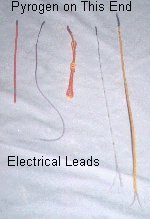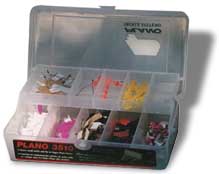Commercial Igniters
 |

Left to right: Estes Lazerfire, Firestar 12", Firestar 18", and two Fire in the Hole igniters for E-G and H-J motors.
Electric matches have a pyrogren coating that is ignited when electricity passes through it. The burning pyrogen ignites the rocket motor.
Different igniter brands and models have different characteristics. Some require 12 volts, some less than 12 volts. Some can be used with electronic devices like timers and altimeters for igniting motors during flight, such as a multiple stage rocket, and ejection charges. Some igniters do not work well with clusters and electronic devices, usually because the battery used by the electronic device cannot supply sufficient voltage or current to a particular igniter.
Commercial Composite Motor Igniters
Characteristics of some common composite motor igniters are listed below in alphabetical order.
CopperheadTypical Copperhead igniter 
-
Copperhead igniters are sold by Aerotech, and provided with
Aerotech motors. They are available in sizes to match all
motors manufactured by Aerotech. They require 12 volts.
These igniters are not recommended for clusters or electronically
controlled
air starts due to the amount of electricity needed to fire them.
Folding or bending the igniters may render them unreliable.
- Daveyfire
- Very little electricity is needed to fire an Daveyfire igniter,
and need to be handled and stored with care.
They can be used alone with smaller (24mm - 29mm) motors.
They are often enhanced with a pyrogen like Firestar pyrogen
for larger motors. Because they need little electricity to
fire they work well with timers and altimeters for staging,
air starts and clusters.
- Fire in the Hole
- Manufactured by Trailing Edge Technologies, these igniters are
available in multiple sizes to fit any motor, and with commonly
used Nichrome bridge wires or special Tungsten bridge wires.
The Tungsten bridge wire igniters are recommended for clusters,
and electrically controlled air starts and staging. Both types
provide quick and reliable ignition. (Note: At the time this
review was written the pyrogen was brittle
and needs to be handled and stored carefully to prevent it from
breaking off the wire.)
- Firestar
- These electric matches are sold as a kit. The pyrogen chemicals
are mixed by the user, and separately purchased wires are dipped
into the pyrogen to create igniters. With 12 volts from a
car, truck or similarly hefty battery these igniters provide consistent
ignition. Due to the amount of electricity needed, they are not
recommended for clusters or electronically controlled air starts.
Wires are available to fit most E and larger (M+) motors. The
pyrogen mix is sufficient to make
- Lazerfire
- Sold by Estes for its Darkstar motors, the igniters are also available in separate packs. The igniters need only 6 volts. They are available in a single length good for most E-G motors.
Note: Additional commercial igniters exist, but have not been used by the author and therefore no data is included at this time.
Submitted by Dean Roth
 |
A handy way to store your ignitors and plugs is to use a little tackle box, sold at fishing supply stores - such as Bass Pro Shops. The Plano 3510, or similar, is perfect to keep those ignitor parts on hand and dry.
Plano is a huge supplier of fishing tackle boxes and makes a great number of styles available, from full-blown tackle boxes to individual storage trays. A variety of storage configurations and sizes are available and are perfect for rocketry.
Submitted by Doyle Tatum
